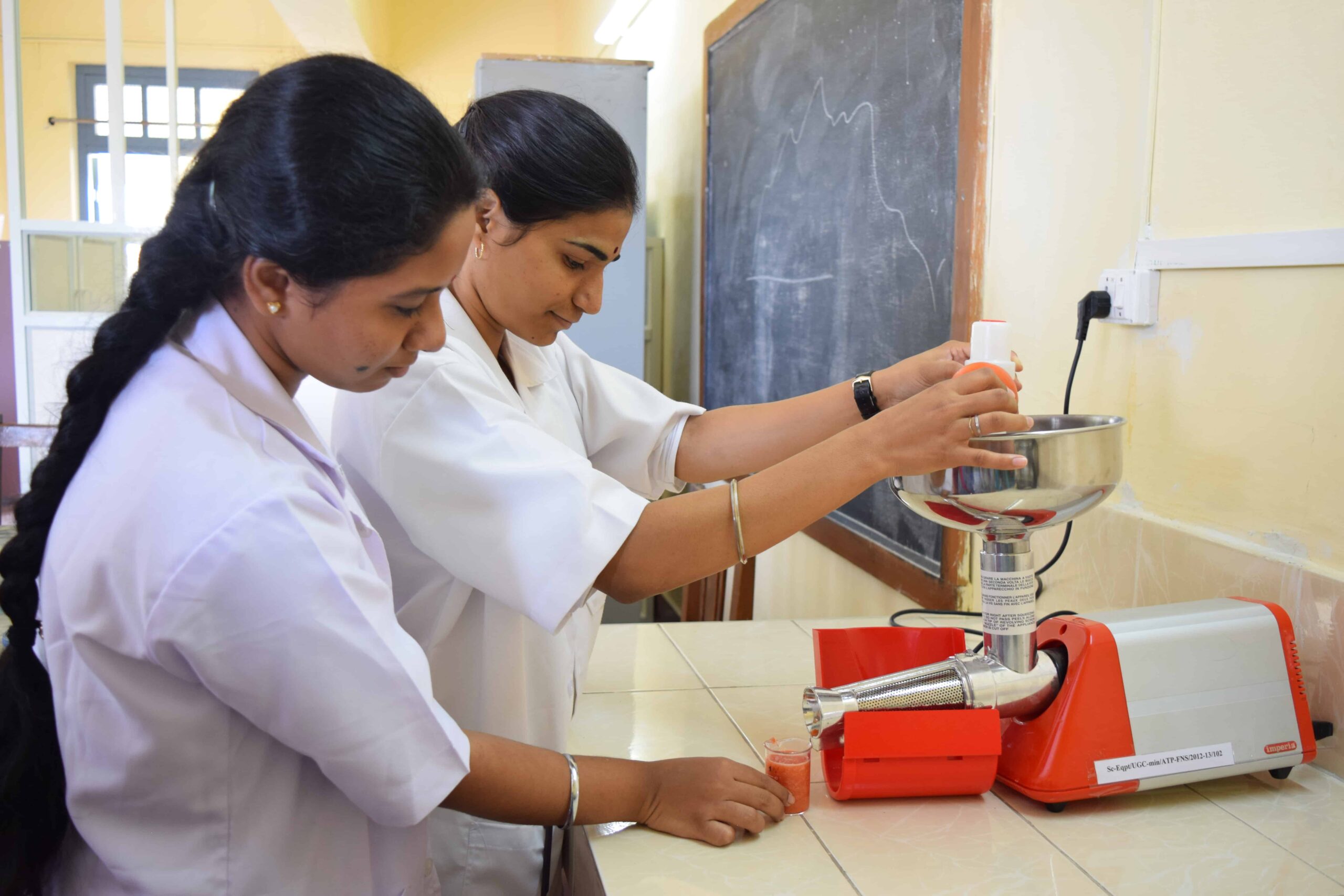Undergraduate Programme
For Women

Duration: 4 Years
Food and Nutritional Sciences is a multidisciplinary field that combines principles from food science and nutrition to understand the relationship between food, health, and well-being. It encompasses various aspects such as food science, nutritional science and assessment, public health nutrition, food processing and preservation, food safety and quality.
Professionals in this field play a critical role in promoting individual and public health by bridging the gap between food and its impact on our bodies. They have the responsibility to make a positive impact of diet on human health and disease prevention.
Food technology specialists use their knowledge of Food processing, innovation, and preservation to create safe, wholesome food items that take advantage of new technical developments.
This comprehensive, multidisciplinary programme encompasses a broad spectrum of fields. The degree presents numerous career opportunities and meets the increasing demand for specialized knowledge. The curriculum emphasizes a profound understanding of theoretical concepts and practical abilities across different subjects, which are vital for success in the industry.
The programme is structured to provide strong academic training in food science, nutrition, dietetics, food processing and preservation, and related disciplines such as physiology, microbiology, biochemistry, and food technology. The diverse scope of subjects provides students with a unique blend of scientific and technical skills designed to meet the needs of careers in the clinical and public health sectors, nutrition, healthcare, and the food industry.
Value and activity-based courses develop essential entrepreneurial skills for students’ employability. The programme’s internship and research project elements equip students for career prospects in food and nutritional sciences.
Specializations
Years 3 and 4 (Semesters 6 and 8), students will choose electives (see the list of courses) to pursue a specialization in either one of the following two major areas:
- Applied Nutrition
- Food Technology
Students can then build on this as a career path for further postgraduate or doctoral research.
MINOR
Additionally, students can pursue a minor degree in one of the following subjects:
1) Wellness and Fitness Management
Students pursuing this minor will gain expertise in conducting safe and effective fitness assessments and evaluations, helping to facilitate lifestyle changes through dietary adjustments. Courses such as Applied Physiology and Kinesiology, Exercise Testing and Prescription, and Fitness Assessment are designed to provide a strong academic foundation, preparing for career opportunities in the wellness and fitness fields.
2) Nutrition and Food Studies
3) Food Products and Processing
The minor courses will be taken in Years 2 and 3 (Semesters 4-6) for B.S. in Food and Nutritional Sciences (12 credits) students and Years 2, 3 and 4 (Semesters 4-8) for B.S. (Hons.) in Food and Nutritional Sciences (16 credits) students.
The Minor in Wellness and Fitness Management is open to students from Food and Nutritional Sciences and other streams (Biosciences, Chemistry, Others). The Minors in Nutrition and Food Studies and Food Products and Processing are open to all streams. However, these minors are not available for B.S. (Hons.)/ B.S. (Hons. With Research) in Food and Nutritional Sciences students.
The student then gets awarded a minor degree in that subject.
B.S. (Hons.) in Food and Nutritional Sciences
For students who complete a 4-year (8-semester) programme of study.
B.S. (Hons. with Research) in Food and Nutritional Sciences
For students who secure a CGPA of 7.5 or more after the first six semesters (3 years of study) and pursue a research project during the fourth year.
Entry & Exit options as per NEP 2020 Policy.
- 10+2 years of schooling from a recognized board (CBSE or equivalent)
- Either passed or appeared for Final exams at XII level before Admissions. If not appeared for XII Standard exams, X and XI Standard marks will be considered
- Consistent academic performance of 60% aggregate marks in X and/or XII Standard
- Age: Preferably below 19 years as of 30th June in the year of admission
YEAR 1
Semester 1
Introductory Food Science
Introductory Food Science (Practical)
Fundamentals of Nutrition
Fundamentals of Nutrition (Practical)
Human Physiology
Human Physiology (Practical)
Computer Basics and Applications (Practical)
Awareness Course I: Sai Education for Transformation (Based on Bhagawan Baba’s Life and Teachings)
Semester 2
Principles of Contemporary Culinary Science and Art
Culinary Skills, Food Photography and Art (Practical)
Food Chemistry
Food Chemistry (Practical)
General Microbiology
General Microbiology (Practical)
Awareness Course II: Unity of Religions
YEAR 2
Semester 3
Fundamentals of Food Processing and Preservation
Techniques in Processing and Preservation of Foods (Practical)
Food Analysis (Practical)
Biochemistry
Awareness Course III: Study of Classics I – Ramakatha Rasavahini
Semester 4
Human Nutrition
Nutrition in Health
Nutrition in Health (Practical)
Institutional Food Management
Institutional Food Management (Practical)
Minor Course
Awareness Course IV: Study of Classics II – Bhagavatha Vahini
YEAR 3
Semester 5
Food Product Development and Sensory Evaluation
Food Product Development and Sensory Evaluation (Practical)
Indian Traditional Foods and Cuisines
Indian Traditional Foods and Cuisines (Practical)
Community Nutrition
Community Nutrition (Practical)
Minor Course
Awareness Course V: Ethos and Values for the Changing World
Specialization Core – Applied Nutrition
Dietetics – I
Dietetics – I (Practical)
Specialization Core – Food Technology
Technology of Cereals, Pulses and Oilseeds
Technology of Cereals, Pulses and Oilseeds (Practical)
Semester 6
Functional Foods and Nutraceuticals
Baking Technology
Wellness Nutrition or Techniques in Baking and Confectionary
Internship
Minor Course
Awareness Course VI: Life and its Quest
Specialization Core – Applied Nutrition
Dietetics – II
Dietetics – II (Practical)
Sports Nutrition
Sports Nutrition (Practical)
Specialization Core – Food Technology
Food Safety and Quality Assurance
Food Safety and Quality Assurance (Practical)
Fruit and Vegetable Technology
Technologies of Plant-Based Products (Practical)
Group I Specialization Elective
YEAR 4
Semester 7
B.S. (Hons.) Courses:
Food Microbiology
Food Microbiology (Practical)
Research Methodology
Computer Applications in Food and Nutrition Research
Community Connect
Minor Course
Awareness Course VII: Education for Life
Specialization Core – Applied Nutrition
Public Health Nutrition and Epidemiology
Public Health Nutrition and Epidemiology (Practical)
Biostatistics – Massive Open Online Course (MOOC)
Specialization Electives – Food Technology
Dairy Technology
Dairy Technology (Practical)
Applied Statistics – Massive Open Online Course (MOOC) (e.g. Swayam)
B.S. (Hons. with Research) Courses:
Food Microbiology
Food Microbiology (Practical)
Research Methodology
Computer Applications in Food and Nutrition Research
Research Project
Research Techniques (Practical)
Minor Course
Awareness Course VII: Education for Life
Specialization Core – Applied Nutrition
Public Health Nutrition and Epidemiology
Public Health Nutrition and Epidemiology (Practical)
Biostatistics – Massive Open Online Course (MOOC)
Specialization Core – Food Technology
Dairy Technology
Dairy Technology (Practical)
Applied Statistics – Massive Open Online Course (MOOC)
Semester 8
B.S. (Hons.) Courses:
Group II Specialization Elective or Massive Open Online Courses (MOOCs)
Group II Specialization Elective (two papers)
Mini Project / Internship
Seminar / Workshop
Minor Course
Awareness Course VIII: God, Society and Man
B.S. (Hons. with Research) Courses:
Group II Specialization Elective or Massive Open Online Courses (MOOCs)
Research Project
Seminar / Workshop
Minor Course
Awareness Course VIII: God, Society and Man
ELECTIVES
Students must choose their electives from one of the following streams (A or B) in each Group:
Group 1
A) Applied Nutrition
Maternal Nutrition
Pediatric Nutrition
Geriatric Nutrition
Space Nutrition
Nutritional Psychology
Nutritional in Weight Management
B) Food Technology
Food Packaging
Food Labelling
Food Laws and Regulations
Extrusion Technology
Group 2
A) Applied Nutrition
Advances in Women’s Nutrition
Health Promotion through Nutrition Communication
Ayurvedic Nutrition and Dietetics
Food Intolerance and Allergies
Functional Foods and Molecular Nutrition
Nutrition in Metabolic and Degenerative Diseases
Medical Nutrition Therapy
Nutrition in Critical Care
Nutrition and Dietetic Counselling
B) Food Technology
Entrepreneurship and Marketing
Emerging Food Processing Technologies
Technology of Plantation Products
Food Additives and Preservatives
Flavour Technology
Food Valorisation and Waste Management

